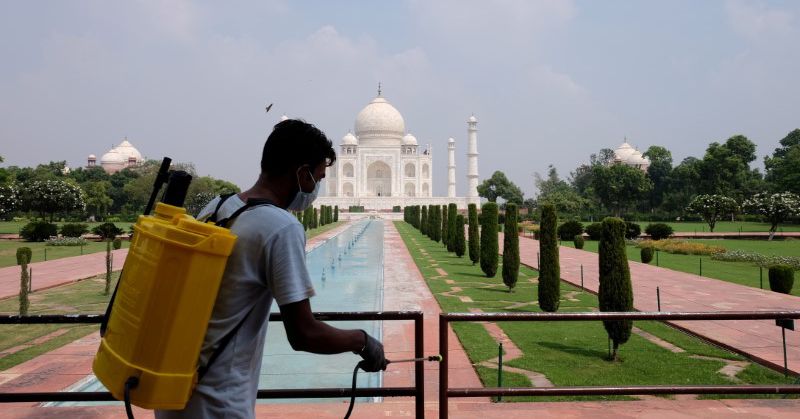Taj Mahal reopens for tourists as India eases COVID-19 curbs
BENGALURU, June 16 (Reuters) – The Taj Mahal reopened to the public on Wednesday as India, still reeling from a disastrous second wave of the pandemic, pushes to lift restrictions in a bid to revitalise its economy.
The 17th-century white marble mausoleum, built by Mughal emperor Shah Jahan in the northern city of Agra, was closed in early April as India introduced strict lockdown measures in an effort to contain a surge in COVID-19 infections that is still killing thousands every day.
Only 650 tourists will be allowed inside the premises of the Taj Mahal at any time, said Prabhu Singh, district magistrate of Agra. The monument normally attracts 7 million to 8 million visitors annually, or over 20,000 people per day.
The state of Uttar Pradesh, where Agra is located, reported 270 new infections overnight and 56 deaths. It is among India’s hardest-hit states in terms of total COVID-19 cases.
Other federally protected monuments, including New Delhi’s Red Fort and Qutub Minar, were also reopened to tourists on Wednesday, even as alarm bells ring in the world’s second most populous country over a resurgence of crowds in major cities that threatens to fuel another spike in infections. read more
On Wednesday India’s health ministry reported 62,224 new COVID-19 infections overnight, slightly higher than the previous day’s figure. The country added 2,542 deaths overnight to bring its total fatalities to 379,573.
Indian media reported traffic jams and a surge in tourists this week to the northern hill station of Shimla, famous for its views of snow-capped Himalayan peaks, further raising fears about the spread of the virus.
The government is pushing to lift restrictions so that jobs and businesses can resume in the battered tourism sector. The number of jobs in travel and tourism in India fell nearly 21% last year, according to the World Travel & Tourism Council.
“Unless international tourism starts, the tourism industry here won’t survive,” said Ramesh Wadhwa, president of the Hotel and Restaurant Owners Association in Agra.
Britain, Canada, the United States and France are among the dozens countries that have restricted travel to and from India.
Wadhwa said he did not expect to see Agra’s hotels see much of an uptick in bookings with the reopening of the Taj Mahal given the limited number of tourists allowed to visit.
Shafiq Ahmed, a local tourist guide, told Reuters he had only seen about 120 people at the monument on Wednesday.
Reporting by Nallur Sethuraman in Bengaluru; Editing by Muralikumar Anantharaman
Our Standards: The Thomson Reuters Trust Principles.



